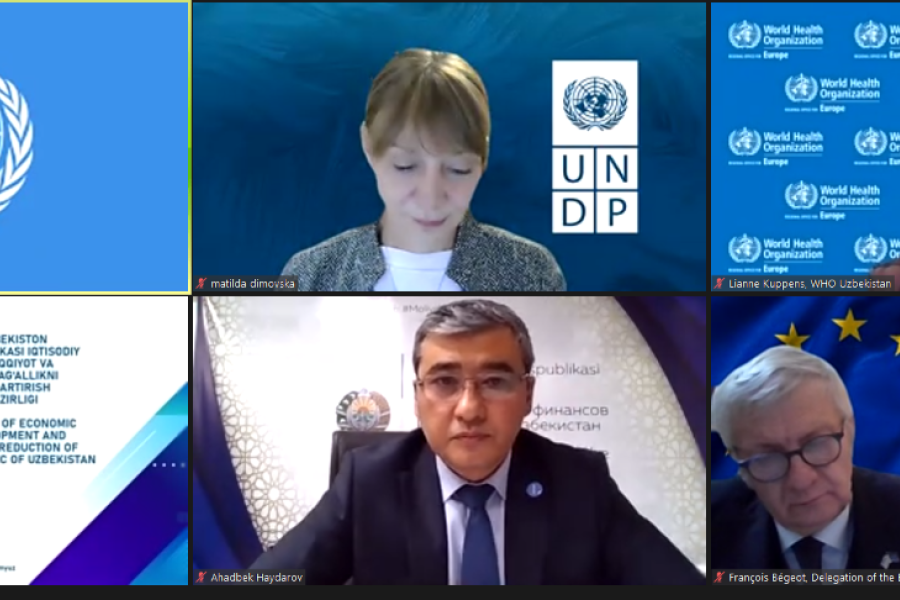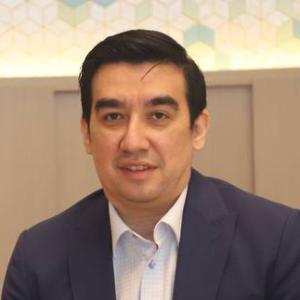UN agencies launch a new Joint Programme to support Uzbekistan’s financing of the Sustainable Development Goals
09 December 2020
- To support Uzbekistan’s aspiration towards sustainable development, a number of UN agencies will join forces in order to help the Government to develop a comprehensive financing framework that leverages existing resources with new forms of public and private financing.
The new Joint Programme that is being launched will help the Government of Uzbekistan to strengthen the overall financing framework for its national development strategies, placing an emphasis on reducing poverty, strengthening health system, protecting the environment, promoting gender equality and ensuring effective governance.

The Integrated National Financing Framework for Sustainable Development in Uzbekistan (INFF), launched today, will run initially through 2022 and be based in the Uzbekistan Ministry of Finance. The United Nations Development Programme will lead the new programme, alongside the United Nations Children's Fund (UNICEF), the World Health Organization (WHO) and the UN Office on Drugs and Crime (UNODC).
UN Resident Coordinator Helena Fraser said the timing of this joint UN programme of support to government could not have been better, as the country seeks to recover from the COVID-10 pandemic. “This Joint Programme will help the Government to recalibrate what will inevitably be reduced financing flows, to turbo-charge solutions for the Government’s ambitious SDG targets, with a specific focus on health, social protection and climate action.”
Ahadbek Haydarov, Deputy Minister of Finance, said there is a need for a comprehensive assessment of the required funding to achieve the country’s development vision in line with the Sustainable Development Goals. “We do hope this Joint Programme on Establishment of Integrated National Financing Framework for Sustainable Development in Uzbekistan will help us in this matter,” he said, adding that the Government is attracting financial resources from various sources including the State Budget and external borrowing to achieve the national development priorities and the SDGs.
UNDP Resident Representative Matilda Dimovska said the INFF is a comprehensive framework that will align Uzbekistan’s national development strategies and their financing with the Sustainable Development Goals. “It will develop public and private financing solutions and help mobilize new resources, while ensuring a more efficient use of existing finances,” she said. “UNDP, with its expertise in inclusive growth and financing development issues is ready to be supporting the Government in its way to establishing a National Financing Framework for the SDGs.”
Under Agenda 2030, world leaders have made ambitious commitments to eradicating poverty by 2030, ensuring that no one is left behind. However, securing enough resources remains a major challenge; developing countries face a gap estimated at US$2.5–3 trillion per year. Given the size, scale and level of sophistication of the global financial system, financing for national development goals is theoretically available, but such financing, mostly private, often do not reach the geographies and people that need them the most. There are, however, opportunities to reorient public and private investment towards the SDGs. State budgets, financial markets, private investors, donations and remittances are all critical to closing the financing gap.
SDGs IN UZBEKISTAN
Uzbekistan has committed to the vision of Agenda 2030 and has made it a governmental priority. With the support of the UN, national SDGs and targets are being integrated into current and new sectoral strategies and programmes. However, to achieve these ambitious targets, Uzbekistan’s spending needs are huge. A 2018 IMF assessment of spending required to achieve SDGs in health, education, and infrastructure found that the country needs additional spending of roughly 8.7% of GDP by 2030 and called for an urgent mobilization of extra resources.
The Joint Programme responds to this need to ensure a more efficient, transparent and results-oriented use of public finance resources, as well as better coordinated and integrated use of public and private financing for national development priorities. It will help the Government to draw on new sources of finance, including green bonds and crowdfunding, remittances, increased savings and investments, and assets recovered from illicit activities.
The Joint Programme is funded by the Joint SDG Fund, which was established by the UN Secretary-General to work across all 17 global goals to transform development practices by incentivizing and enabling new and innovative development approaches. The Joint SDG Fund aims to support Resident Coordinators and UN Country Teams to partner with Governments in order to stimulate uptake of integrated and transformative policies leading to the creation of smart financing strategies that put SDG progress into high gear at global, regional, and country levels.
Note: The Joint SDG Fund is formed with contribution of the following donor countries: Denmark, EU, Germany, Ireland, Luxembourg, Monaco, Netherlands, Norway, Portugal, Spain, Sweden, and Switzerland


